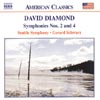Diamond Symphonies Nos 2 & 4
An American eccentric, heard to advantage in one of his most lyrical works
View record and artist detailsRecord and Artist Details
Composer or Director: David (Leo) Diamond
Genre:
Orchestral
Label: American Classics
Magazine Review Date: 9/2004
Media Format: CD or Download
Media Runtime: 59
Mastering:
Stereo
DDD
Catalogue Number: 8 559154

Tracks:
| Composition | Artist Credit |
|---|---|
| Symphony No. 2 |
David (Leo) Diamond, Composer
David (Leo) Diamond, Composer Gerard Schwarz, Conductor Seattle Symphony Orchestra |
| Symphony No. 4 |
David (Leo) Diamond, Composer
David (Leo) Diamond, Composer Gerard Schwarz, Conductor Seattle Symphony Orchestra |
Author: David Gutman
Here is another welcome Naxos reinstatement. Two-thirds of a first-rate David Diamond disc that originally appeared on the Delos label in the 1990s. The early Concerto for small orchestra has been dropped, possibly because the featured band was not the Seattle Symphony, but the meat of the programme remains. The booklet-notes are helpful and the sound remains unspectacularly good.
The Fourth Symphony is probably the most familiar of all Diamond’s scores, thanks to the pioneering efforts of Leonard Bernstein who both conducted the première in 1948 and made a studio recording in 1958. Schwarz is less pushy in the finale, the nearest the music gets to the ‘swaggering’ mode of Bernstein’s own music, but the more modern sound brings out the luminescent qualities of what is after all a predominantly lyrical piece. Generally less extrovert, the wartime Second Symphony is perhaps also less successful, not quite sus-taining its considerable length. That said, the epic sweep and civility of its discourse should command our respect, even if its debts to Hindemith, Shostakovich and the usual American suspects, Harris and Copland, are perhaps too obvious. In place of the sinewy, almost Tippettian use of counterpoint you find in some of his later scores, Diamond here sometimes sounds more like an American Rubbra, at least until the boisterous finale. I do urge you to try this disc.
Unlike the derivative neo-Romantic fare being churned out by so many US composers today, Diamond’s tactfully elegiac, carefully contrived conservatism does actually ring true.
The Fourth Symphony is probably the most familiar of all Diamond’s scores, thanks to the pioneering efforts of Leonard Bernstein who both conducted the première in 1948 and made a studio recording in 1958. Schwarz is less pushy in the finale, the nearest the music gets to the ‘swaggering’ mode of Bernstein’s own music, but the more modern sound brings out the luminescent qualities of what is after all a predominantly lyrical piece. Generally less extrovert, the wartime Second Symphony is perhaps also less successful, not quite sus-taining its considerable length. That said, the epic sweep and civility of its discourse should command our respect, even if its debts to Hindemith, Shostakovich and the usual American suspects, Harris and Copland, are perhaps too obvious. In place of the sinewy, almost Tippettian use of counterpoint you find in some of his later scores, Diamond here sometimes sounds more like an American Rubbra, at least until the boisterous finale. I do urge you to try this disc.
Unlike the derivative neo-Romantic fare being churned out by so many US composers today, Diamond’s tactfully elegiac, carefully contrived conservatism does actually ring true.
Discover the world's largest classical music catalogue with Presto Music.

Gramophone Digital Club
- Digital Edition
- Digital Archive
- Reviews Database
- Full website access
From £8.75 / month
Subscribe
Gramophone Full Club
- Print Edition
- Digital Edition
- Digital Archive
- Reviews Database
- Full website access
From £11.00 / month
Subscribe
If you are a library, university or other organisation that would be interested in an institutional subscription to Gramophone please click here for further information.




